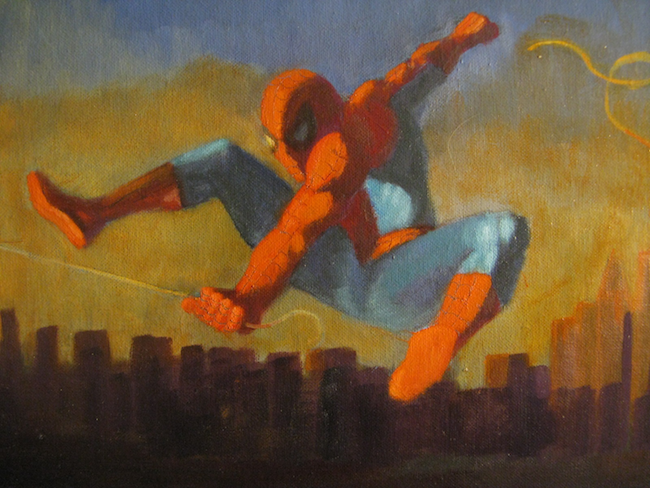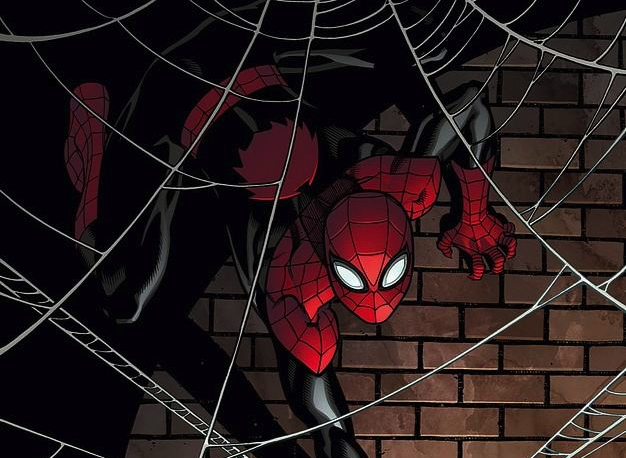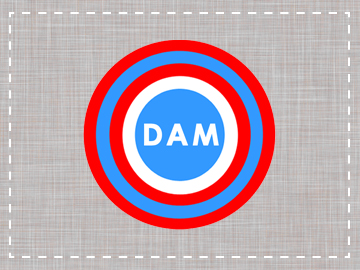Spider-Man and the Consistency of American Superheroes
- Weekend Read
- Oct 4, 2013
- 0 Comments

I am often annoyed or disturbed when I see people get bent out of shape about cultural shifts, trying to handle the fact that something from their childhood was no longer the same, that trends changed and music, books, movies and interpretations of their childhood heroes changed with them. Personally, I felt, I would be ready for things to change because everything changes. Of course, with these opening sentences, you can hear the “however”; the moment when I have difficulty with something changing. And sure enough, there is a “however,” I was not entirely ready to handle a shift in the characterization of Spider-Man.
This summer, I became more interested in superhero comics after reading independent comics semi-regularly for years. I returned to a diverse medium filled with great visual and verbal storytelling. Our view of superheroes had changed significantly since I read superhero comics as a child in the 90s, which was an admittedly bad time for the genre. Today, “superheroes” have won a semi-respectable position within our larger American cultural pantheon. And, for good reason, the superhero represents a distinctly American take on the hero. But at the same time, because of the way in which the genre functions, we cling rather tightly to consistency at least in who are heroes are. Much like any cultural figure, to see our heroes fall from grace, to see them as something less than scrupulous can be jarring and deeply upsetting.
The world of superhero comics is one populated by long running characters who ultimately act as blank canvases for a variety of situations. They are frame tales where writers and artists throw the character(s) in new and more ingenious scenarios. This is very similar to what people have done for centuries, whether it be King Arthur, Paul Bunyan, Sherlock Holmes, etc. However, the superhero is a uniquely American take on the hero, a costumed do-gooder ultimately upholding the status quo (my definition relies heavily on the research of Robin Rosenberg and Peter Coogan, who recently edited What is a Superhero?, a collection of essays that provides an excellent starting point for anyone curious about the subject). On an individual level, the superhero occupies a certain mythological position for many of us, primarily rooted in our initial encounters with them as children.
Growing up, we see a world lacking in fairness and invest ourselves in fictitious figures possessing extraordinary powers or abilities to play out our fantasies of justice or as a simple escape. We watch them triumph again and again, ultimately confirming, on some level, our belief in justice, our belief that good will always triumph over evil even if only in the tales we tell ourselves. Given this emotional investment, it is not surprising that many get upset when someone fundamentally shakes up the initial formula, or rather the formula in place when we were first introduced to these characters because that formula does actually shift with the time on some level, we just don’t notice or it is so gradual, we hardly recognize when it happens.
As a result of our own expectations, we approach any new stories as ones we imagine to be anchored by a preexisting characterization and structure. You become attached to the character and, much like any relationship; you rely on certain things always staying the same. You wouldn’t want your best friend to wake up one day and have the brain of your worst enemy, would you? We forge connections with these heroes based on our own identification with them or because they represent something we aspire to, they can be a version of us at our best even when they are at their worst. How they find their way out of a struggle can be a sort of strength.
For me, Marvel’s characters always seemed more approachable than their DC counterparts. Spider-Man, the X-Men, The Fantastic Four, these were characters I could more easily relate to. They have always been a mix of pathos, wit, and an abiding code of ethics. These were relatively good people thrown into extraordinary circumstances. The story centered on how to make the best of these new circumstances while still trying to live a happy life and to make a positive contribution. Growing up, Spider-Man was the one that filled my imagination. He was funny, he was heroic and most of all he was nerdy and teased in school like me. If he could make it through the day and still have time to save Manhattan, I could make it through a school day.

When I picked these comics up again twenty years later, the characters were the same, albeit with new experiences and a few always-temporary deaths in play. I expected and found some consistency. However, there was one hero who was very different and of course it was Spider-Man. Now I had to deal with a cultural change in a way I was not ready for.
Upon picking up the thread of recent issues, I quickly learned Peter Parker was not the same, in fact he wasn’t technically even Peter Parker, but Otto Octavius aka, Dr. Octopus. Doctor Octopus had taken over Parker’s body and was going to prove that he could be a much better Spider-Man than Parker. In fact, he was going to prove he was a much better Peter Parker as well. Thus, Spider-Man is no longer a hero but a villain masquerading as one and a complete asshole. The name of the comic had changed as well. Amazing Spider-Man ended with issue 700 and The Superior Spider-Man had taken its place. Daniel Slott, the writer, had fundamentally altered something I had grown up taking comfort in; my own cannon of myths had been changed and I was thrown.
At first, I was, illogically, really angry. Now it was my turn to be someone upset about something from my childhood changing. How could someone do this to Spider-Man? What am I supposed to do with a version of my childhood hero who is actually an initially unlikeable character, egotistical, not funny, and kind of reckless? I would have no problem with this type of character normally. If anything, we have been conditioned to appreciate these anti-heroes as entertaining ripostes on the genre’s established tropes. But those riffs never really touch the characters they are responding to; those original figures remain relatively static. This change was uncomfortable, Dan Slott, the writer responsible, had upset one of the genre’s static frames. The Peter Parker I grew up with was nowhere to be found. And yet, as I continued to give the comic a chance, I began to see my discomfort as something equally rewarding in itself.
It would be easy to be angry and dismiss the comic outright if not for the fact that these comics were actually quite good. Slott accomplished this not by falling into the 90’s trap of reinventing the genre by making them more gritty or needlessly dark. Instead, he had maintained the original tone even if Spider-Man’s methods were different and he was a total jerk. Slowly, I came around to this change. I realized that Slott was took an enormous change by playing with something so fundamental as the structuring myth of Spider-Man, a pop cultural constant since the early 60s’. I had even begun, uncomfortably, to root for this new version of Parker. Ultimately, in playing with our expectations, in putting the reader in a somewhat uncomfortable position and for continuing this for over a year, Slott was ensuring that mainstream comics could be taken somewhere a little more daring and maybe taken a little more seriously.
Isn’t that what a work should do, take us someplace slightly uncomfortable, play with our expectations just a little? Even in a medium built around familiarity, shouldn’t things be shaken up, not reset so easily? Hoping things stay the same forever only leads you somewhere stale and boring, maybe safe but certainly never interesting. To go in and really mess with a character like Spider-Man and to do it in a way that does not end up being cheap is actually quite an impressive feat.
Slott is working well within the established mythos of Spider-Man, in fact The Superior Spider-Man could be read as a much more grandiose experiment with the logic of its fictional universe. Spider-Man is marked as being always-already down on his luck. For whatever reason, Peter Parker can never really catch a break in any long-term sense because of the fact that he lives a double life. The press reviles spider-Man, his enemies continually come back to haunt him and he is always lying to those close to him about his secret identity. A successful Spider-Man would not be Spider-Man (also this would effectively eliminate the need for future issues but still).
Of course, if you spend your life watching from the sidelines, you end up having plenty of ideas about what someone would do differently in another person’s shoes. This has been fodder for a variety of plots for years, Freaky Friday being the most apparent. So, of course Dr. Octopus decides he can do better, he can out Spider-Man Spider-Man. And, so far, he has. Since taking over, Dr. Octopus has improved the hero’s costume, built robots to bolster his firepower and done the most normally villainous thing of all, hired a private army to help him out. Parker/Octopus even went so far as to blackmail J. Jonah Jameson, former editor of the Daily Bugle and Spider-Man’s most famous detractor, into showing unilateral public support for the hero as Mayor of New York. It would seem that the reason Parker has done such a so-so job in his life as Spider-Man would be because he is somewhat incompetent. Maybe a super villain is actually better, through the application of more dramatic tactics, at being a super hero.

In a larger scale, isn’t this the sort response to heroes we continue to have and one we have been wrestling with for years? Wouldn’t we want our heroes to take literal action in stopping crime and making the world a safer place? In the real world, isn’t our response to most news stories about crime or even pop culture instances of law enforcement in line with this need to seek justice by any means necessary. Law and Order has effectively demonized constitutional protections for years, we know the only way to get always guilty suspects is to punish them mercilessly. We seek universal force where possible, we want to be armed and ready to take down bad guys in a Manichean battle between good and evil and we hope for problems to be fixed decisively and effectively. However, and effective and final justice like this rarely becomes a positive good in the long run. It often leads to outright fascism.
This is where Slott’s Spider-Man becomes a very timely hero and a very American investigation of one the biggest questions in the early years of the 21st century. The battle between freedom and security, between military might and diplomacy, between decisive action and careful contemplation. Two Spider-Mans represent two possible sides of the argument. Peter Parker (the real one) as the studied and nuanced approach to solving problems infinitely more complex than they first seem and Parker/Octopus as decisive action before anything else. Christopher Nolan’s Dark Knight trilogy also investigates this issue at length, but grew increasingly conservative as it played out, ending as an epic argument for the sovereignty of Batman as the law and this being the key to his success. Slott’s Spider-Man actually seems more nuanced and a more careful analysis (Octopus is above all an egotistical super villain). One hopes that Parker/Octopus can learn why his methods won’t work or that it blows up in his face.
I learned that it wasn’t so easy to handle my established myths changing with the times. I was upset because, on some level, I invested a lot in Peter Parker. I held a certain security that things can be black and white and that our heroes will always be the same. To see this shift with the times is to see the times actually shift. And as superhero comics continue to position themselves as a distinctly American mythos, with new generations working over these heroes the same way oral story tellers would make up tales of folk heroes in the past, we have to accept that even our heroes change with the time, that people can do something radically different with them and that it can be rewarding and entertaining. Slott’s Superior Spider-Man is a timely investigation of many issues around us. The question of justice, security and freedom is one that the genre of Superhero comics is uniquely positioned to answer. It can explore the ramifications of a world where justice can be taken into individual hands with superhuman force, where one person can do what armies can and more. Spider-Man’s recent change is an ecstatic and entertaining look at these central concerns.
Still, I would be lying if I said I wasn’t hopeful that they announce the return of the real Peter Parker at the upcoming New York Comic Convention in mid-October. I do need some stability in my adulthood.


0 Comments
Be the first to leave a reply!